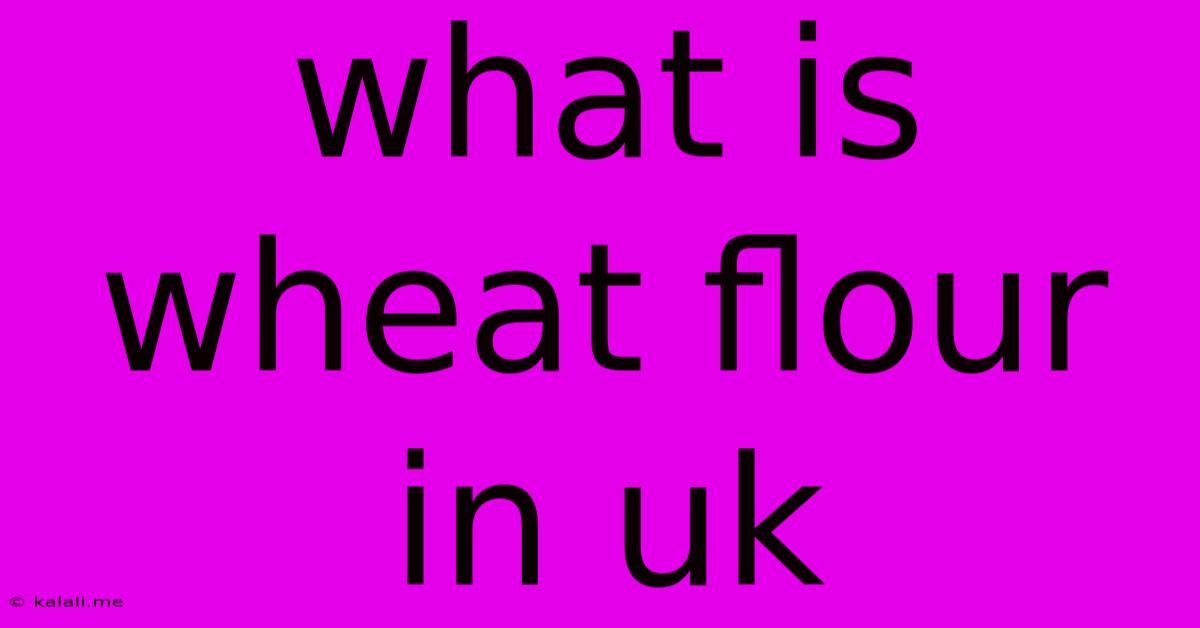What Is Wheat Flour In Uk
Kalali
May 19, 2025 · 3 min read

Table of Contents
What is Wheat Flour in the UK? A Comprehensive Guide
Wheat flour is a staple ingredient in UK baking and cooking, forming the base for countless dishes, from loaves of bread to cakes and pastries. Understanding the different types available is crucial for achieving the best results in your culinary creations. This guide delves into the specifics of wheat flour in the UK, exploring its varieties, uses, and nutritional aspects.
Understanding the Basics: Wheat Flour Production
Wheat flour is produced by milling wheat grains. This process involves grinding the kernels to separate the endosperm (the largest part of the grain), the bran (the outer layer), and the germ (the embryo). The proportion of these components retained dictates the type of flour produced, impacting its colour, texture, and baking properties.
Types of Wheat Flour in the UK
The UK market offers a diverse range of wheat flour, each with its unique characteristics:
1. Plain Flour (All-Purpose Flour)
- Description: This is the most common type of wheat flour in the UK. It's a general-purpose flour made from the endosperm of the wheat grain, with a relatively low protein content (around 8-10%).
- Uses: Ideal for cakes, biscuits, pastries, and some bread recipes. Its lower protein content means it develops less gluten, resulting in a tender crumb. It’s a versatile option for most everyday baking.
- Synonyms: All-purpose flour.
2. Strong Bread Flour
- Description: This flour boasts a high protein content (around 12-14%), leading to greater gluten development. Gluten is the protein that provides elasticity and strength to dough, essential for bread making.
- Uses: Specifically designed for bread making, particularly artisan loaves. The strong gluten structure allows the dough to rise well and hold its shape.
- Synonyms: Bread flour, strong flour.
3. Self-Raising Flour
- Description: This convenient flour already contains baking powder, a chemical leavening agent. This means you don't need to add extra baking powder to your recipes. It usually has a lower protein content than strong bread flour.
- Uses: Suitable for quick breads, scones, and cakes where rising is achieved primarily through chemical leavening rather than yeast.
- Synonyms: Self-raising flour.
4. Wholemeal Flour (Whole Wheat Flour)
- Description: This flour includes all parts of the wheat grain – the endosperm, bran, and germ. This makes it a more nutritious option compared to refined flours, as it retains the fiber and nutrients found in the bran and germ.
- Uses: Ideal for adding to bread recipes for a denser texture and richer flavour. It can be used in baking cakes but might produce a slightly denser product.
- Synonyms: Whole wheat flour, wholegrain flour.
5. Other Specialty Flours
The UK market also offers a variety of other specialty flours, including:
- Brown flour: A blend of white and wholemeal flour.
- Rye flour: Made from rye grain, which lends a distinct flavour.
- Gluten-free flour blends: For individuals with celiac disease or gluten intolerance. These often use alternatives like rice flour, potato flour, and tapioca flour.
Nutritional Considerations
Wheat flour provides carbohydrates, which are the primary source of energy for the body. Wholemeal flour, in particular, is richer in fiber, vitamins, and minerals compared to refined flours like plain flour. Fiber aids digestion and can contribute to overall health.
Choosing the Right Flour
Choosing the right type of flour depends entirely on your recipe and desired outcome. Always check the recipe's instructions carefully to determine the appropriate flour type. Understanding the differences in protein content and the presence of additives will significantly affect the texture and taste of your baked goods. Experimenting with different types of flour can help you expand your baking skills and discover new flavour profiles.
Latest Posts
Latest Posts
-
Difference Between A Priest And A Vicar
May 19, 2025
-
Is White Spirit The Same As Methylated Spirit
May 19, 2025
-
Grinding Noise When Braking But Pads Are Fine
May 19, 2025
-
Can U Mix Water With Antifreeze
May 19, 2025
-
Thunderbirds F A B What Does It Mean
May 19, 2025
Related Post
Thank you for visiting our website which covers about What Is Wheat Flour In Uk . We hope the information provided has been useful to you. Feel free to contact us if you have any questions or need further assistance. See you next time and don't miss to bookmark.